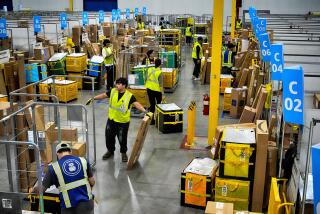Consumers Seem Resigned to Slow Growth : Economy: Survey finds confidence dipped in August. U.S. says profits of corporations continued to rise in second quarter.
NEW YORK — Consumer spirits continued to flag in August as Americans grew resigned to the continuing slow pace of economic growth, the Conference Board said Tuesday in releasing its monthly survey on consumer sentiment.
Meanwhile, the Commerce Department reported that profits at U.S. corporations continued to rise in the second quarter despite sluggish growth in the economy.
The Conference Board, a business research organization, said its consumer confidence index edged down to 59.0 in August from 59.2 in July. Last month’s reading was the same as in August, 1992.
The index remained sharply lower than a post-election high of 78.1 recorded in December. The index has a base of 100, set in 1985.
“We’re still in a zone where there’s a good deal of concern on Main Street about where America is headed in terms of economic performance,” said Stephen S. Roach, a senior economist at Morgan Stanley & Co.
Roach said reality has sunk in for consumers that job creation and income growth are slow and will remain so for a while. The recently passed tax increase, he added, hasn’t helped build confidence.
Economists say concerns about health care reform are also adding to consumer uneasiness. In the August Conference Board survey, twice as many people feared fewer jobs would be available in the next six months as those who expected more jobs. Since the beginning of the year, those who feared business conditions would worsen in coming months has increased almost without interruption.
The consumer confidence index reached its highest level in the last 12 months in December, following a gain in the election month of November. It remained above 70 in January but began to slip that month and has fallen more or less consistently since then.
The boom in confidence that immediately followed Bill Clinton’s election, one economist said, was bound to wane.
The Conference Board’s monthly confidence survey, based on a sampling of 5,000 households, is considered an indicator of future economic activity.
Meanwhile, corporations earned after-tax profits at a seasonally adjusted annual rate of $264.3 billion in the April-June period, up 2.1% following a 1.6% advance in the first quarter, the Commerce Department said.
In contrast, the economy, as measured by the gross domestic product, grew at a rate of only 0.8% in the first quarter and 1.8% in the second.
Economist Martin Regalia of the U.S. Chamber of Commerce said companies are managing to push profits up faster than the overall economy by purchasing cost-cutting equipment such as computers and by strictly controlling labor costs. He predicted that profits will continue to grow.
“You can’t keep laying off more staff and adding more computers. But, as the cost cutting starts to wane, we should see a modest pickup in economic demand,” he said.
Profits for all of last year rose 7.1%, compared to a 2.4% gain in 1991.
* ECONOMIC GROWTH
The economy grew at a better than expected 1.8% pace in the second quarter. Revised data shows growth was stronger than believed during George Bush’s last months as President. A1
More to Read
Inside the business of entertainment
The Wide Shot brings you news, analysis and insights on everything from streaming wars to production — and what it all means for the future.
You may occasionally receive promotional content from the Los Angeles Times.










